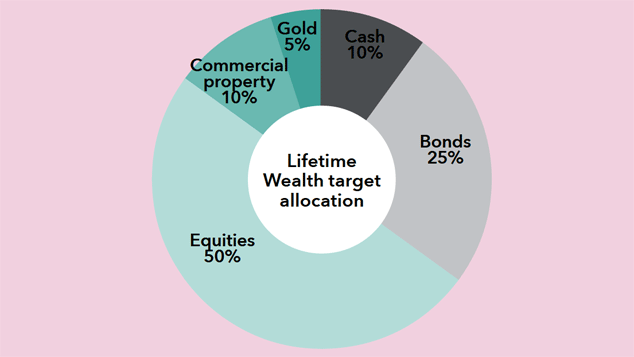Get the latest financial news, insights and expert analysis from our award-winning MoneyWeek team, to help you understand what really matters when it comes to your finances.
You are now subscribed
Your newsletter sign-up was successful
Want to add more newsletters?

Twice daily
MoneyWeek
Get the latest financial news, insights and expert analysis from our award-winning MoneyWeek team, to help you understand what really matters when it comes to your finances.

Four times a week
Look After My Bills
Sign up to our free money-saving newsletter, filled with the latest news and expert advice to help you find the best tips and deals for managing your bills. Start saving today!

Equities
Little has changed
Britain's unexpected vote to quit the EU saw many stockmarkets tumble to their lowest levels since the global-growth scare in January. But the turbulence has not changed the big picture. The European and Japanese equity markets are supported by central banks that are likely to boost liquidity further through interest-rate cuts or money printing; newly created cash tends to find its way into markets. Valuations are also reasonable. The US market is expensive and the central bank is still more inclined to raise interest rates than cut them.
Emerging markets remain on track for a gradual recovery from their January lows. Their valuations are very reasonable compared with developed markets and the macroeconomic backdrop is looking more encouraging. Overall growth in emerging markets ticked up in the first quarter, the first improvement in three years, as Capital Economics points out.
MoneyWeek
Subscribe to MoneyWeek today and get your first six magazine issues absolutely FREE

Sign up to Money Morning
Don't miss the latest investment and personal finances news, market analysis, plus money-saving tips with our free twice-daily newsletter
Don't miss the latest investment and personal finances news, market analysis, plus money-saving tips with our free twice-daily newsletter
The recovery in commodities prices is the main driver, while the downturns in Brazil and Russia may now have bottomed out. Our favourite emerging markets are those that have made progress with structural reforms and have large domestic markets capable of offsetting a lacklustre global economy. These include India and Vietnam.

Gold
A strong year continues
The yellow metal has had a standout year. The volatility caused by Brexit propelled it to a two-year high above $1,350 an ounce this week. It has now gained 25% in dollar terms this year; in sterling, it has jumped by a third. Once the latest turbulence subsides, gold may tread water, given its unusually strong recent run, but investors should hold onto it as portfolio insurance. Inflation could return faster than anticipated, and there are plenty of sources of potential turmoil that could renew demand for an asset seen as the ultimate safe haven.

Bonds
Yields reach fresh lows
Britain's ten-year gilt yield fell below 1% this week, a record low. Political uncertainty usually prompts a sell-off of a country's assets but investors are apparently hoping that interest rates will fall, while the Bank of England could also restart quantitative easing. There are now $8.73trn of government bonds on a negative yield, according to Bloomberg, underlining how ridiculously expensive government paper has become. Only consider those from the safest countries with positive yields.

Cash
Rates are staying put
The latest market turmoil has put back the interest-rate rises the markets had pencilled in on both sides of the Atlantic, implying yet more misery for savers who have been battling with near-zero rates for almost a decade now. The Bank of England could well cut interest rates this summer, potentially delaying a hike until the year after next. America may be forced to raise rates next year if inflation climbs faster than expected.

Commercial property
A rude awakening?
Shares in UK real estate investment trusts plunged on Friday, as investors worried about the impact of Brexit on the commercial property market, especially in central London where demand from the financial services industry is crucial. The true consequences are not likely to be clear for many months, but we think investors' worst fears are unlikely to be realised.
The Lifetime Wealth portfolio
The portfolio is implemented through exchange-tradedfunds (ETFs) and index funds. Within each asset class wechoose these funds to weight the portfolio to the markets weconsider most attractive on a long-term view. For example,we can favour Japanese equities over American ones, orUK government bonds over US ones. We aim to minimiseunnecessary trading and to keep costs as low as possible.Lifetime Wealth is designed to be a sensible and low-hassleway to grow and manage your wealth over the long term. Click here for more details.

Get the latest financial news, insights and expert analysis from our award-winning MoneyWeek team, to help you understand what really matters when it comes to your finances.
MoneyWeek is written by a team of experienced and award-winning journalists, plus expert columnists. As well as daily digital news and features, MoneyWeek also publishes a weekly magazine, covering investing and personal finance. From share tips, pensions, gold to practical investment tips - we provide a round-up to help you make money and keep it.
-
 Can mining stocks deliver golden gains?
Can mining stocks deliver golden gains?With gold and silver prices having outperformed the stock markets last year, mining stocks can be an effective, if volatile, means of gaining exposure
-
 8 ways the ‘sandwich generation’ can protect wealth
8 ways the ‘sandwich generation’ can protect wealthPeople squeezed between caring for ageing parents and adult children or younger grandchildren – known as the ‘sandwich generation’ – are at risk of neglecting their own financial planning. Here’s how to protect yourself and your loved ones’ wealth.

